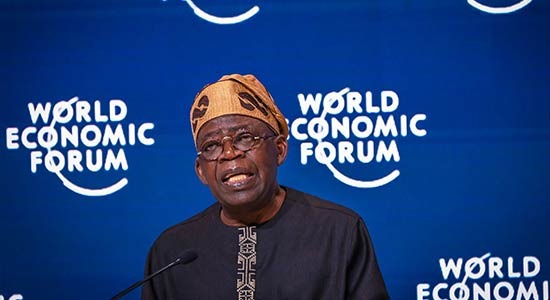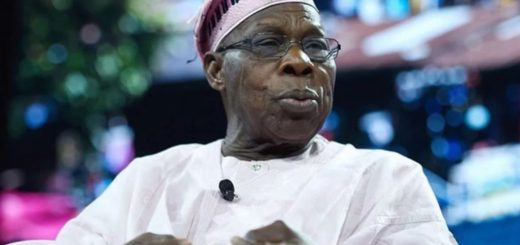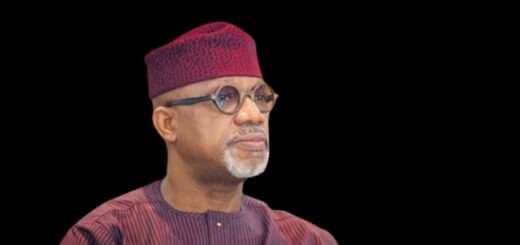Tinubu Secures $600 Million Investment From Maersk Chairman Robert Uggla To Expand Nigeria’s Port Infrastructure
 President Bola Tinubu has secured an additional $600 million foreign investment for the expansion of the nation’s ports infrastructure to accommodate more container shipping services in Nigeria’s ports.
President Bola Tinubu has secured an additional $600 million foreign investment for the expansion of the nation’s ports infrastructure to accommodate more container shipping services in Nigeria’s ports.
The new $600 million investment, which was offered from the Danish shipping and logistics company, A.P Moller-Maersk, would be complementing the $1 billion already being invested by the administration into seaport reconstruction across the eastern and western flanks of the country.
The new investment decision was disclosed on Sunday by the Chairman of A.P Moller-Maersk, Mr. Robert Maersk Uggla, during a meeting with President Tinubu on the sidelines of the World Economic Forum Special Meeting on Global Collaboration, Growth and Energy for Development in Riyadh, Saudi Arabia.
The president added that it would further support the country’s port modernization efforts and port process automation through his administration’s implementation of the national single window project, which is aimed at enhancing trade facilitation, easing import/export flow, reducing corruption at the ports, while improving the efficiency and transparency of port processes in Nigeria.
“We appreciate your business and the contribution you have made and continue to make to our country’s economy over time. We do not take our partners for granted. A bet on Nigeria is a winning bet. It is also a bet that rewards beyond what is obtainable elsewhere.
“More investment opportunities are available, and my government has worked on various reforms to encourage investments. We need to encourage more opportunities for revenue expansion and minimize trans-shipments from larger ships to smaller ships,” he said.
The president assured Maersk of his administration’s commitment to collaborating and creating an enabling environment for businesses to thrive in the country.
He cited Maersk’s previous partnership in the development of the Ogun State container terminal as a testament to fruitful partnerships with the reputable logistics company.
Highlighting Maersk’s longstanding engagement in Africa’s most populous nation and his belief in the future of Nigeria, Chairman of A.P Moller-Maersk, Mr. Robert Maersk Uggla said his company had made significant investments of over $2 billion in Nigerian ports and other activities.
He emphasized the potential for Nigerian ports to accommodate larger container ships and stressed the need for expanding port infrastructure to meet this demand while reducing the cost of logistics.
”We have seen a significant opportunity for Nigeria to cater for larger container ships. Historically, most of the West African coasts are already served by smaller ships. Currently, we see an opportunity to deploy larger ships to Nigeria. To achieve this, we need to expand the port infrastructure, especially in Lagos, where we need a bigger hub for logistics services. The growth potential is hard to quantify.
”We believe in Nigeria, and we will invest $600 million in existing facilities and make the ports accommodating for bigger ships.
”In my humble view, given that Nigeria is the most populous country in Africa, Nigeria should have the best and biggest port and we are very eager to invest, and we will continue that dialogue with the relevant Nigerian authorities to explore further investment opportunities,” the Maersk Chairman said.
Also, President Bola Tinubu has said that his administration’s removal of the fuel subsidy was in the best interest of Nigeria, saying it was necessary not to plunge the country into bankruptcy.
He stressed the country’s belief in economic collaboration and inclusiveness among other nations to drive stability on the global stage.
Tinubu stated these during a panel session at the ongoing World Economic Forum in Riyadh, Saudi Arabia, on Sunday, which focuses on Global Collaboration, Growth, and Energy for Development.
He said, “For Nigeria, we are immensely consistent with belief that the economic collaboration and inclusiveness are necessary to engender stability in the rest of the world.
This sparked tense reactions and calls from Nigerians and concerned stakeholders like the Organised Labour Union as well as opposition figures and the international community on the dire consequences that had affected the standard of living of the populace.
However, the President had admitted in his New Year message on January 1, 2024, that even though it was a tough decision to pronounce the removal of the fuel subsidy, its payments by the FG were an “unsustainable financial burden” on the country.
“It is going to be difficult, but the hallmark of leadership is taking difficult decisions at the time it ought to be taken decisively. That was necessary for the country. Yes, there will be blowback, there is an expectation that the difficulty in it will be felt by a greater number of the people, but once I believe it is their interest that is the focus of the government, it is easier to manage and explain the difficulties.
“Along the line, there is a parallel arrangement to really cushion the effects of the subsidy removal on the vulnerable population of the country. We share the pain across the board, and we cannot but include those who are vulnerable.
“Luckily, we have a very vibrant youthful population interested in discoveries by themselves, and they are highly ready for technology, good education committed to growth. We are able to manage that and partition the economic drawback and the fallout of subsidy removal,” he said.
Tinubu equally noted that the fuel subsidy removal brought about accountability, transparency, and physical discipline for the country.
Speaking on the exchange rate unification and the swinging rate of the Naira against other global currencies like the United States dollar, Tinubu said, “The currency management was necessary equally to remove the artificial elements of value in our currency. Let our local currency find its level and compete with the rest of the world currency and remove arbitrage, corruption, and opaqueness.
“That we did at the same time. That is a two-engine problem in a very template situation for the government, but we are able to manage that turbulence because we are prepared for inclusivity in governance and rapid communication with the public to really see what is necessary and what you must do.”













